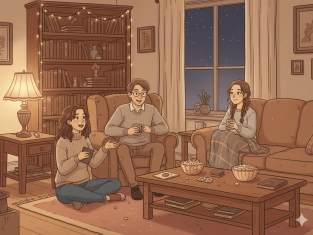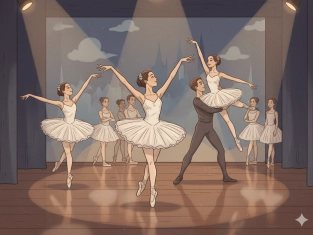Future Continuous
Table of Contents
Exercises
Explanation
1. Form
Affirmative: will be + verb-ing
-
I will be working at 9 a.m.
-
She will be studying in the library tonight.
-
They will be travelling around Spain in July.
Negative: will not (won’t) be + verb-ing
-
I won’t be working on Monday morning.
-
He won’t be driving during the night.
-
We won’t be staying in the city for long.
Questions: Will + subject + be + verb-ing?
-
Will you be working this weekend?
-
Will she be joining us for the meeting?
-
What will they be doing at lunchtime?
2. When Do We Use the Future Continuous?
A. An action in progress at a specific moment in the future
We use the Future Continuous to show what will be happening at an exact point in the future.
-
At 7 p.m., I will be preparing dinner.
-
This time tomorrow, she will be flying over the Atlantic.
-
They will be watching a film when you arrive.
This tense paints a picture of an ongoing activity.
B. Two simultaneous future actions
It can describe two long actions happening at the same time in the future.
-
Oliver will be cooking, and Emma will be setting the table.
-
We will be driving north while our friends will be travelling south.
-
The technicians will be installing the speakers as the choir is rehearsing.
C. Planned, arranged, or expected events
Even though the Future Continuous is not strictly a “planning” tense, it can express something that is scheduled, organised, or naturally expected to happen.
-
Don’t call after 11 p.m. - I’ll be giving a late lecture.
-
The bus will be arriving in about ten minutes.
-
We’ll be starting the class exactly at 3:30.
This use often sounds more polite or less direct than will + infinitive.
D. Polite questions about future plans
The Future Continuous is a gentle and polite way to ask about someone’s intentions.
-
Will you be using the computer this afternoon?
-
Will your friends be staying with you next week?
-
Will you be attending the workshop tomorrow?
These questions feel less intrusive than simple Will you…?
3. Time Markers
Common expressions used with the Future Continuous include:
-
at 5 o’clock
-
this time tomorrow
-
next week at this time
-
from 2 to 4
-
during the evening
-
all day / all night
Examples
-
I’ll be revising all morning.
-
This time next week, we’ll be hiking in the mountains.
-
From 3 to 5, I’ll be interviewing candidates.
Quick Summary
|
Use |
Example |
|
Action in progress at a future time |
I’ll be working at 9. |
|
Two future actions happening at the same time |
They’ll be cooking and chatting. |
|
Planned or expected future situation |
She’ll be staying with us for a few days. |
|
Polite questions about someone’s plans |
Will you be joining us later? |

